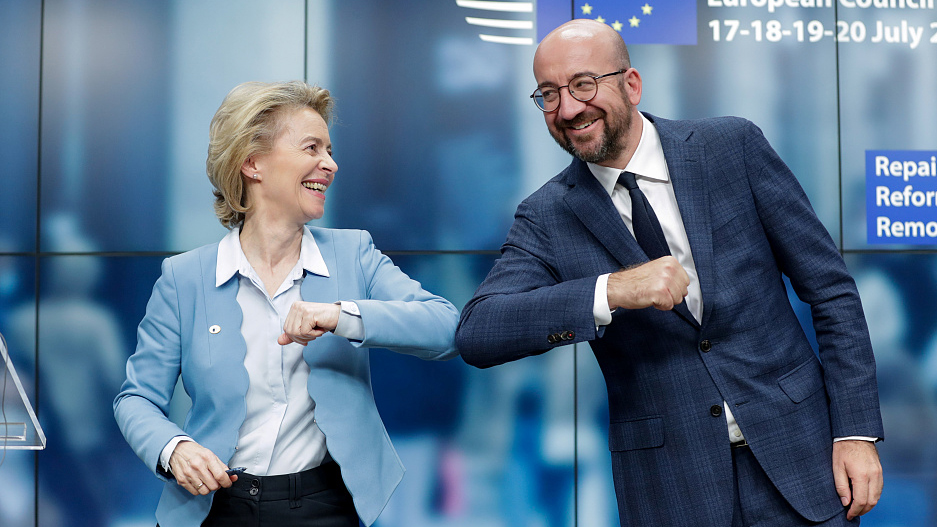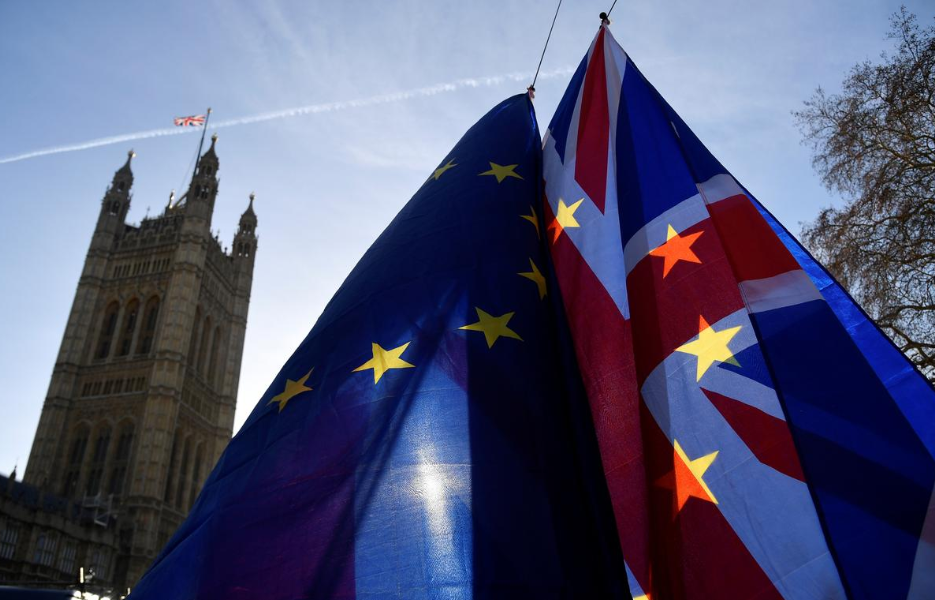02:30

As the EU summit wraps up its marathon sessions in Brussels, leaders of the 27 member states have walked out of the conference with a deal that EU officials call a historical step towards greater integration. While this apparent victory indeed calls for celebration, experts say it should not overshadow the underlying problems that were brought to light during the fractious summit.
Immediately after the summit drew to an end on Tuesday, European Council President Charles Michel took to Twitter to express his gratification. "This is a strong deal. And most importantly, the right deal for Europe right now... We showed collective responsibility and solidarity and we showed also our belief in our common future."
Over the course of the five-day summit, a series of painstaking negotiations and several last-ditch efforts finally produced an agreement on a massive EU budget as well as a 750 billion euros (860 billion U.S. dollars) recovery fund designed to lift the virus-ravaged economies out of an unparalleled recession, breaking a months-long deadlock that saw rounds of rhetorical skirmishes traded between leaders of the block's member states.
The EU is a group of countries that are constantly compromising on issues pertaining to the common good of the bloc, Wang Yiwei, director of Center for European Studies at Renmin University of China, told CGTN.
If the EU leaders hadn't hammered out a deal during the summit, they would have to wait until after the summer break, which is a month later.
"Time was not on their side, as many parallel developments raised the stakes on the outcomes of this much anticipated summit," said Wang.
Among the many predicaments the EU is facing are a potential Brexit without a withdrawal agreement, an increasingly inward-looking policy perpetuated by its biggest trading partner the United States, and a pandemic that continues to ransack businesses.

Demonstrators hold EU and Union flags during an anti-Brexit protest opposite the Houses of Parliament in London, Britain, December 17, 2018. /Reuters
Demonstrators hold EU and Union flags during an anti-Brexit protest opposite the Houses of Parliament in London, Britain, December 17, 2018. /Reuters
By year's end, Britain and the EU may part their ways without agreeing on major issues such as trade and investment terms. Should that happen, both would be hemorrhaged by far-reaching consequences. Meanwhile, the coronavirus has sent the bloc into the worst economic slump in its history, with financial indicators reaching record lows and an economic recovery not yet in sight. In early July, the European Commission said the EU economy would shrink 8.3 percent this year, a downgrade from predictions released in May that already saw a 7.4 percent contraction.
"These realities have severely tarnished the bloc's economic prospect and hence created a sense of urgency among EU member states," said Wang. "The immediate need to shore up market confidence, to coordinate efforts in reopening economies, and to bolster the predictability of a long-term economic recovery, served as the chief motivation for the bloc's leading members, particularly Germany which holds the rotating presidency, to help set aside differences and come to this agreement."
Problems remain
While applause and commendation converged around the EU headquarters on Tuesday, the strenuous negotiation process that led to its fruition has exposed the deep-seated problems that have long existed within the bloc.
"Hopes were running quite low before the deal was reached," Wang said.
The main bones of contention that were settled in the final agreement included a readjustment of the non-repayable grants involved in the coronavirus rescue package meant for the hardest-hit countries, as well as an adherence to the rule of law that's linked to access for the fund – a last-minute demand put forward by "the Frugal Five" but drew the ire of Eastern European countries and especially Hungary and Poland.
But these compromises were the result of acrimonious negotiations that lasted months.
"The Frugal Five," the fiscally conservative, richer states Austria, Denmark, Finland, the Netherlands and Sweden, initially rejected the size of the coronavirus bailout bond, and later stood their ground even after new proposals were made to reduce the fund's sum.
Though the "Frugals" eventually caved in, their intransigence reflected a growing disinclination to help out their EU partners, a trend that also highlights a north-south divide as northern Europe generally has a healthier financial background while the southern European countries are less equipped to deal with an economic crisis.
Given the inconsistent extent of outbreak severity in each country, citizens in countries that are less affected by the pandemic may also not embrace the idea of carrying extra financial burdens for the benefit of those seriously battered, Wang said.

First customers return to Field's, shopping center, after the lockdown to prevent the spread of the coronavirus disease (COVID-19) in Copenhagen, Denmark, May 11, 2020. /Reuters
First customers return to Field's, shopping center, after the lockdown to prevent the spread of the coronavirus disease (COVID-19) in Copenhagen, Denmark, May 11, 2020. /Reuters
Northern European countries such as Finland and Denmark are faring relatively better in dealing with the pandemic, while COVID-19 cases and death tolls in countries located on the southern tip of the continent have reached levels far worse than the north.
"Reasons for the reluctance to help are also historically rooted," Wang added. "During the European debt crisis, it was also the northerners that bore the cost of extending aid to debt-stricken nations in the south. Now that they are again asking for help due to the coronavirus havoc, the northerners are finding themselves apathetic to the notion."
But antipathy to the rescue plan was not just rife within donor countries. It also existed at the receiving end of the fund. The Italian public also did not welcome such a relief package because it came with attachments that would constrain the country's fiscal policies, Wang said.
"The spread of COVID-19 has further magnified the north-south gap," said Wang. "On the one hand, the southern states have higher population density and their citizens are more inclined to emphasize individual freedoms. On the other hand, governments of these countries are not regulating their fiscal policies as strictly as the northerners, while the small-government style in the south is also impeding effective response to the coronavirus."
On top of that, a crack between eastern and western Europe has also captured attention. The additional demand that a rule of law conditionality be added to the deal aggravated the already tensed ambiance during the summit. Both Hungary and Poland had once threatened to veto the package, and Polish Prime Minister Mateusz Morawiecki went so far as to rail against the "Frugals," calling them "a group of stingy, egotistic states" that looked at things through the prism of their own interests.
Though both sides eventually met halfway on the issue, the EU's authority was profoundly weakened and the rift on shared values has proven to be increasingly apparent, said Wang.
All these are proof of a growing disapproval for the bloc's mechanisms, he said, adding that citizens of the member states are becoming less identified with the EU.
While fulfillment of the landmark deal has shown a sign of unity and seems to have dealt serious blows to euro-skepticism, the damages caused by the pandemic are non-negligible.
"COVID-19 fears have fueled xenophobia in countries that are less affected by the disease," said Wang. "Initially this bigotry was only directed at Asians, but now we are also seeing those feelings among Europeans from different countries. That leaves room for the rise of both populism and euro-skepticism."